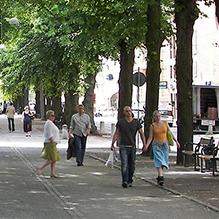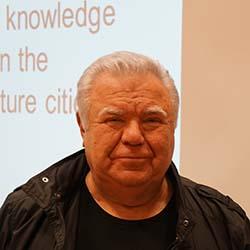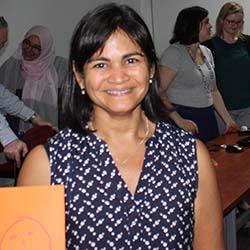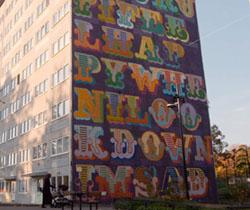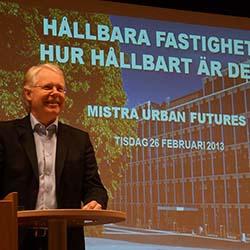6 million SEK to Sustainable Lifestyles
Researchers from the Mistra Urban Futures project WISE, Well-being in Sustainable cities, Jonas Nässén and Jörgen Larsson has been granted 6 million SEK from the Swedish research council Formas for two new research projects within the sustainable lifestyles area. The two areas being studied are the phenomenon ‘peak car’ and time use.
‘Peak car’
After a century of steady growth in automobility, there is now growing evidence of a decline in USA, Australia and Europe, this development has been termed ‘peak car’. This trend is also emerging in Sweden. The project “Peak car: analysis of trends and their implications for transport planning” is based on an interdisciplinary collaboration between Jonas Nässén at the department of Energy and Environment, Chalmers University of Technology and Cecilia Jakobsson Bergstad at the Environmental Psychology Unit, University of Gothenburg. Focus for the project will be on underlying drivers of “peak car” and its implications for transport planning.
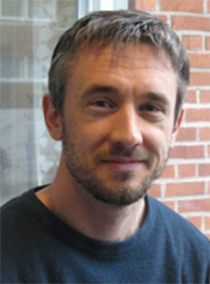 - It is important to understand this peak car trend as it contradicts transport planning scenarios that projects continued growth in automobility. Too high forecasts of car use may lead to sub-optimal investments that favour the car over other transport modes, which could further complicate the fulfilment of the long term climate targets, says Jonas Nässén, project leader, Chalmers university of Technology.
- It is important to understand this peak car trend as it contradicts transport planning scenarios that projects continued growth in automobility. Too high forecasts of car use may lead to sub-optimal investments that favour the car over other transport modes, which could further complicate the fulfilment of the long term climate targets, says Jonas Nässén, project leader, Chalmers university of Technology.
The project will analyse trends in car ownership, car use and driving license rates. Analysis of attitudes and underlying motives for car ownership and use will also be conducted. This new knowledge will be used to develop scenarios for future car use and explore their implications for transport planning.
Time use and sustainability
For middle classes worldwide material scarcity has become less and less acute as a problem. The importance of time scarcity has on the other hand, only grown in comparison. Individuals and families find themselves struggling to manage their everyday lives, as increasing work-related demands, long commuting times, high parenting ambitions, etc. often make incompatible claims on their energy and fixed 24-hour time budgets. At the same time, the availability of affordable and attractive spare time activities has increased dramatically. The resulting experiences of time pressure have been shown to contribute to sleep disorders as well as a widespread sense of stress and low well-being in individuals.
While the question of sustainable consumption, how individuals use their money, has received significant attention in research, that of sustainable time use patterns, how individuals use their time, has been relatively neglected. The project Time Use and Sustainability: Do New Time Use Patterns Provide a Key towards a More Sustainable Society?, led by Jörgen Larsson, will study the role of time use patterns in building a more sustainable society.
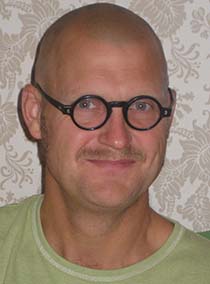 - The aim of the project is to examine how new time use patterns can support the transition towards a more sustainable society, says Jörgen Larsson, project leader, Chalmers university of Technology.
- The aim of the project is to examine how new time use patterns can support the transition towards a more sustainable society, says Jörgen Larsson, project leader, Chalmers university of Technology.
Two sub studies will be carried out. The first will focus on time use trends, as changes in time use patterns can either support or hinder sustainable development. The second sub study will analyse the consequences of worktime autonomy, which is a policy that enables time use patterns to be shaped by individual needs and preferences. The City of Gothenburg has recently introduced a right for all its employees to work either full time or part time. This new time policy has the potential to lead to major consequences for both individuals, organizations, and the society at large.
Building on the WISE project
The design of both of these projects have been strongly influenced by the close collaboration between practitioners and researchers in the WISE-project for which Jörgen Larsson is the co-ordinator for and where Jonas Nässén is one of the subproject leaders. The projects will be placed at Chalmers and both of the projects will benefit from collaboration forms within WISE.
Project information
Name: Peak car: analysis of trends and their implications for transport planning
Project Leader: Jonas Nässén, Assistant Professor, department of Energy and Environment, Chalmers University of Technology
Funding granted: 3 149 000 SEK
Time span: Jan 2015-Dec 2017
Name: Time Use and Sustainability: Do New Time Use Patterns Provide a Key towards a More Sustainable Society?
Project Leader: Jörgen Larsson, Post Doc, division of Physical Resource Theory at the Department of Energy and Environment, Chalmers University of Technology
Funding granted: 2 991 000 SEK
Time span: Jan 2015-Dec 2017
Questions?
Jörgen Larsson, project leader, jorgen.larsson@chalmers.se
Jonas Nässén, project leader, jonas.nassen@chalmers.se
Read more
WISE - Well-being in Sustainable cities
